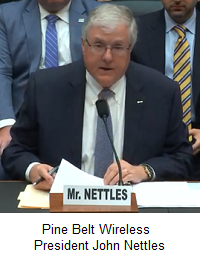Instead of naming the policy to replace insecure communications network equipment “rip and replace,” it should be called “replace and then rip,” so networks are not disrupted. That’s what Pine Belt Wireless President John Nettles told lawmakers Friday during a hearing on securing the nation’s telecom supply chain.
The House Energy and Commerce Telecommunications and Technology Subcommittee is considering several bills concerning 5G security.
One bipartisan measure, H.R. 4459, would authorize $1 billion to help rural telecom carriers rip out and replace any equipment from foreign suppliers deemed a security threat.
Though many U.S. carriers have removed equipment from Chinese telecoms Huawei and ZTE from their communications networks, “It’s still a significant issue for smaller carriers,” said Subcommittee Chair Mike Doyle (D-PA). “We must help smaller carriers remove suspect equipment for the betterment of the country.”
Full Energy and Commerce Committee Chair Greg Walden (R-OR) agreed, saying: “Unfortunately, our adversaries have no reservations about subsidizing their pet companies, and thus become attractive options for the budget sensitive providers. Many of these providers don’t have an army of consultants with the necessary security clearances to understand what vulnerabilities exist and how to inform their purchasing decisions. For those who receive federal support to build out broadband networks in unserved areas…we cannot set them up for failure by requiring them to select the lowest cost equipment option, only then for Uncle Sam to later say, “well, not that lowest cost equipment.” The bills being considered model the replacement program after the broadcast reimbursement program for repack costs, he said.
Alabama-based Pine Belt Wireless provides 4G LTE services in five counties, including many areas where it’s the only carrier. “While the industry buzzes with excitement of the great things that will soon come to bear as 5G networks are built-out, we at Pine Belt and numerous other small companies like us across the country have been all but frozen in our tracks since early last year by the cloud of uncertainty cast over us when the presence of certain vendor equipment in our networks was publicly called into question,” Nettles testified. That uncertainty surrounding whether the company can keep ZTE equipment has led to delays in routine expansion efforts, according to the telecom executive. Because of the uncertainty, Nettles said, “Right now I’m looking at do I even stay in the business or get what I can for it and walk away?”
His family-owned company rebuilt its network from 2014 to 2017, using government funds (Mobility Fund Phase 1) to purchase ZTE gear. It was mandated to use the lowest-cost methodologies to serve the greatest number of road-miles, according to the executive.
“At the time, no vendor selections were prohibited in the auction. ZTE’s bid was almost one-third of that of the highest bidder, and 25 percent below the second lowest bidder,” out of five total bidders, Nettles testified. “With no restrictions in place and facing deployment challenges to serve our sparsely populated area, this equipment selection was a no-brainer. This selection not only enabled us to meet our mandated MFI buildout requirement, but also provided us with a reliable platform on which we could quickly deploy 4G and VoLTE,” he said.
Nettles urged lawmakers to include a list of covered communications equipment or services within the bills. “Smaller rural carriers require certainty to know what equipment and services can and cannot be deployed without creating risks to communications networks,” he said.
Walden said HR 3459 calls for the gear replacement to be completed within one year. He asked Nettles if he could meet the timeline. Nettles said it would be a challenge, and noted the language also gives the FCC up to a year to decide what’s on the replacement equipment list. “If it involves both our RAN and our CORE, it’s virtually impossible to do it,” he said. A labor shortage is likely, Nettles explained. “If we had to rip it out first, it’d be like selling your car before buying a new one and you’re walking.”
Bills before the committee are:
- H.R. 4462, the “Studying How to Harness Airwave Resources Efficiently Act of 2019”
- H.R. 4459, the “Secure and Trusted Communications Networks Act of 2019”
- H.R. 4461, the “Network Security Information Sharing Act of 2019”
- H.R. 2063, the “Eliminate From Regulators Opportunities to Nationalize The Internet in Every Respect Act”
- H.R. 2881, the “Secure 5G and Beyond Act of 2019”
- H.R. 4500, the “Promoting United States Wireless Leadership Act of 2019”
- H. Res. 575, expressing the sense of the House of Representatives that all stakeholders in the deployment of 5G communications infrastructure should carefully consider and adhere to the recommendations of “The Prague Proposals”
By Leslie Stimson, Inside Towers Washington Bureau Chief
September 30, 2019





Reader Interactions